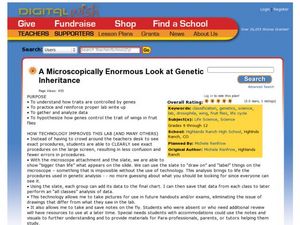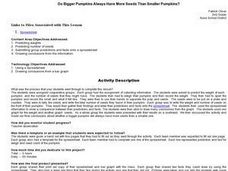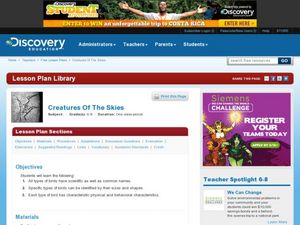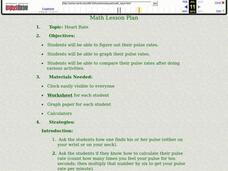Film English
365 Grateful
Encourage gratitude with a short film. Pupils first explore what grateful means and come up with five things they are grateful for. After a discussion, they watch the short film twice and discuss the content after each viewing,...
Curated OER
Plants and Ecosystems
The relationships within and between ecosystems can be explored. after examining an area for living and non-living things students complete the same examination in the forest ecosystem. Students identify abiotic and biotic elements in an...
Curated OER
Hand Span and Height
Is there a relationship between hand span width and height? Statisticians survey each other by taking measurements of both. A table that can hold data for 24 individuals is printed onto the worksheet, along with questions for analysis....
Curated OER
Comparing Cities and Their Common Functions
Ninth graders begin the lesson by watching a PowerPoint on the functions of cities. In groups, they use the internet to research various cultures throughout history and the cities that were formed at the time. They present their findings...
Institute for Teaching through Technology and Innovative Practices
The Right Number of Elephants
How can you tell if a number of items is reasonable? Combine math and language arts with a fun lesson based on Jeff Shepard's The Right Number of Elephants. After reading the book, kids discuss amounts of other items and create...
TELEC
What's Your School Like?
S1 and S2 language learners practice the skills of predicting and scanning as they examine images and read the script of interviews with two young students.
Scholastic
The First Thanksgiving Feast for Grades 6–8
It's time for the feast! Young historians complete their study of the First Thanksgiving by completing an online activity, watching a slideshow, and examining a First Thanksgiving timeline. After answering text-dependent questions to...
Curated OER
A Microscopically Enormous Look at Genetic Inheritance
High schoolers use microscopes to examine fly families and analyze their genetic inheritance. In this genes lesson plan, students also use the chi square for comparing genes and compare the class results as a whole.
Curated OER
Do Bigger Pumpkins Always Have More Seeds Than Smaller Pumpkins?
Second graders, in groups, predict the weight of a pumpkin and the number of seeds it might have. Then they find and record the actual weight and actual number of seeds. They compare and contrast the size of the pumpkin to the number of...
Curated OER
Unit Rates
Students calculate unit rates with fractions and whole numbers. In this algebra activity, students compare numbers, perform long division, and calculate the rate of different units through conversions. They model some of the problems as...
Curated OER
Working With Improper Fractions
In this math worksheet, young scholars learn how to recognize improper fractions, how to convert them to whole or mixed numbers, how to compare fractions and simplify fractions. Students complete 75 questions. Examples and directions are...
Curated OER
Creatures of the Skies
Students create a bird identification game. In this classification lesson, students work in pairs to collect information about a specific bird. They use a bird field guide to aid in the research. They challenge other students in their...
Nemours KidsHealth
Germs: Grades K-2
Students demonstrate knowledge about germs. In this health lesson, students investigate what germs are, how to protect the skin by comparing the skin to apple skins, and the proper hand washing technique for getting rid of germs....
Curated OER
Aldridge Sawmill -- The Story in Numbers
Seventh graders view a recent transparency of the average rainfall zones of the state of Texas. Using another transparency, they identify the Piney Woods subregion of the Gulf Coastal Plain and locate national forests and sawmills. ...
Curated OER
Just the Facts! Exploring Order of Operations and Properties of Real Numbers
Sixth graders explore the concept of order of operations. In this order of operations lesson, 6th graders view a powerpoint about order of operations in society. Students post on a blog about order of operations.
Curated OER
Keeping Us in Stitches Activity: Whole Cloth Quilt Design
Students examine how decorative motifs are adapted to other types of objects by craftsmen and artists. They examine photos on the Illinois State Museum website, discuss design elements, adapt a motif to a line drawing, and transfer a...
Curated OER
A Whole Lot of Shakin' Goin' On!
Students gather data about the 1906 and 1989 earthquakes, make comparisons between the two, and determine the factors that influence the amount of shaking that occurs in an area due to an earthquake. They identify that the distance is...
Curated OER
Eggs-tra Special Sounds
Learners explore different sounds. In this sound lesson, students participate in an egg hunt. The eggs are filled with different materials and hid around the room. Learners find the eggs and chart the different sounds they hear. Students...
Curated OER
Graphing Heart Rates
Students take their pulse rates. In this graphing lesson, students take their pulse rates and graph them. Students do various physical activities and graph the differences in their pulse rates.
Curated OER
Harcourt Story: Eleanor and Amelia Go for a Ride
Fourth graders are introduced to a list of vocabulary words as it relates to the story Eleanor and Amelia Go for a Ride and a use graphic organizer to clarify the meaning of the text. In this "Eleanor and Amelia Go for a Ride"...
Curated OER
Exponential Growth versus Polynomial Growth
Your algebra learners explore the values of two types of functions in order to compare growth rates in this short cooperative task. Two types of solutions are given, using a table of values and an abstract argument.
Curated OER
An Apple a Day
Students sort and compare apples before making apple prints. In this apple lesson, students use a painting to inspire art prints made with apple halves. Students compare and sort apples.
Curated OER
Fraction Models
Third graders make models of fractions and mixed numbers. Using fraction strips and drawing pictures, 3rd graders develop conceptual understanding of the equivalent forms. Students use the number line to represent and compare...
Cornell University
Atomic Bonding
Explore the connection of surface area to bonding within atoms. Learners complete lab investigations to model changing surface area with different sizes and concentrations of atoms. A flour fireball demonstration follows the labs to...























